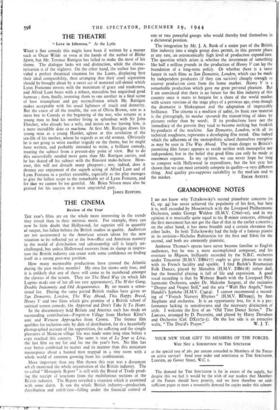" Love in Idleness." At the Lyric
WHAT a fine comedy this might have been if written by a master such as Oscar Wilde or even at the hands of the author of Blithe Spirit, but Mr. Terence Rattigan has failed to make the most of his theme. The dialogue lacks wit and distinction, while the charac- terisation is of the slightest. On the other hand, the author has pro- vided a perfect theatrical situation for the Lunts, displaying first their ideal compatability, then arranging that their cruel separation should be brought about by a sweet act of maternal self-denial which Lynn Fontanne invests with the maximum of grace and tenderness, and Alfred Lunt bears with a robust, masculine but anguished good humour ; then, finally, restoring them to one another in a final scene of love triumphant and gay reconciliation which Mr. Rattigan makes acceptable with his usual lightness of touch and dexterity. But the cause of all the trouble, the son of Olivia Brown, sent as a mere boy to Canada at the beginning of the war, who returns as a young man to find his mother living in splendour with Sir John Fletcher, who already has a wife, and insists on her leaving him, is a mere incredible deus ex machina. At first Mr. Rattigan draws his young man as a young Hamlet, aghast at this revelation of the sex-life of his mother, whom he regards as an old woman. Obviously he is not going to write another tragedy on the theme, but he might have written, and probably intended to write, a brilliant comedy, treating the subject from a present-day point of view. But to do this successfully needed more guns than Mr. Rattigan carries, and he has skated off his subject with the flimsiest make-believe. How- ever, this will not disturb many playgoers ; .nor, indeed, does it destroy our enjoyment of the superb acting of Alfred Lunt and of Lynn Fontann in a perfect ensemble, especially as the play manages to give the fullest scope to the remarkable art of Lynn Fontann, and for that we cannot be too grateful. Mr. Brien Nissen must also be praised for his success in a most ungrateful part.
JAMES REDFERN.


























 Previous page
Previous page